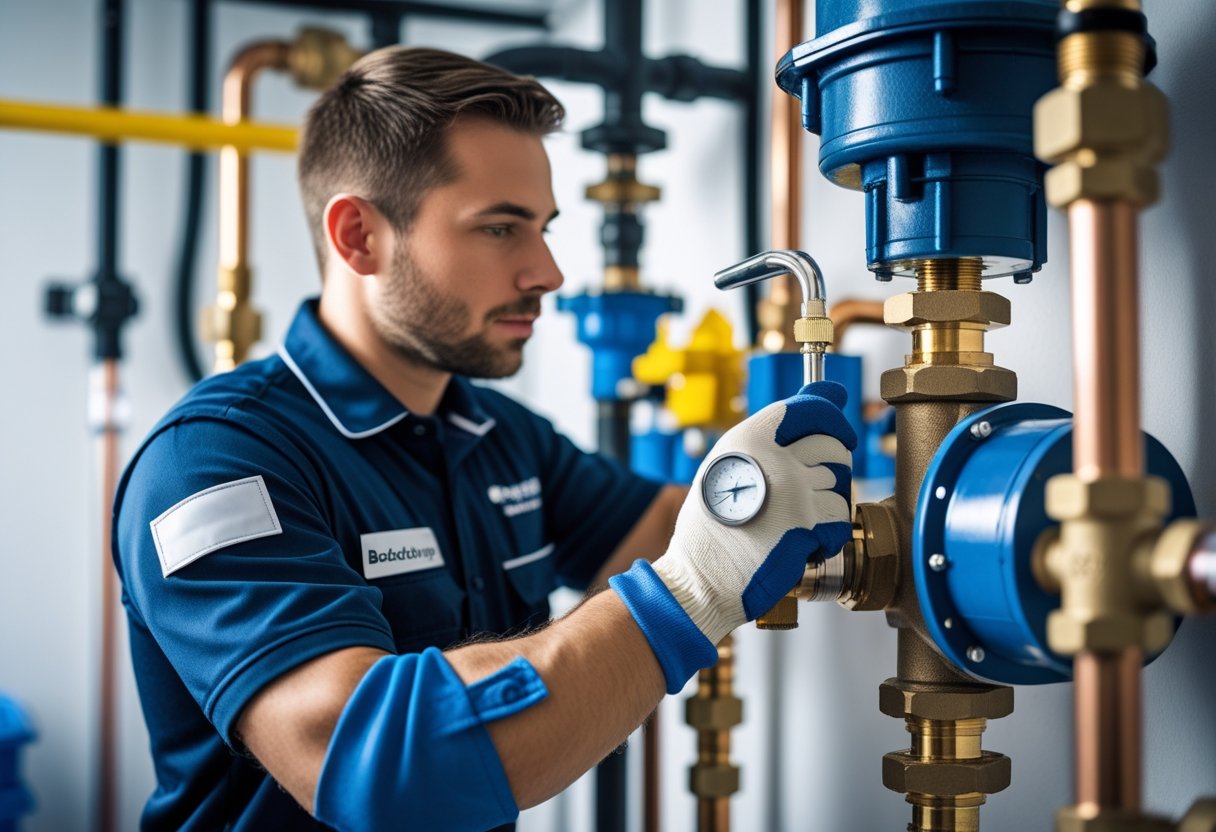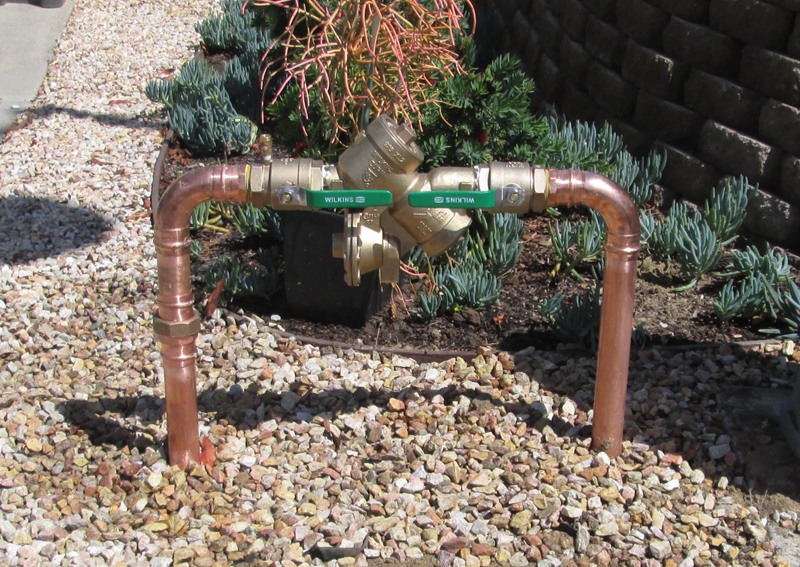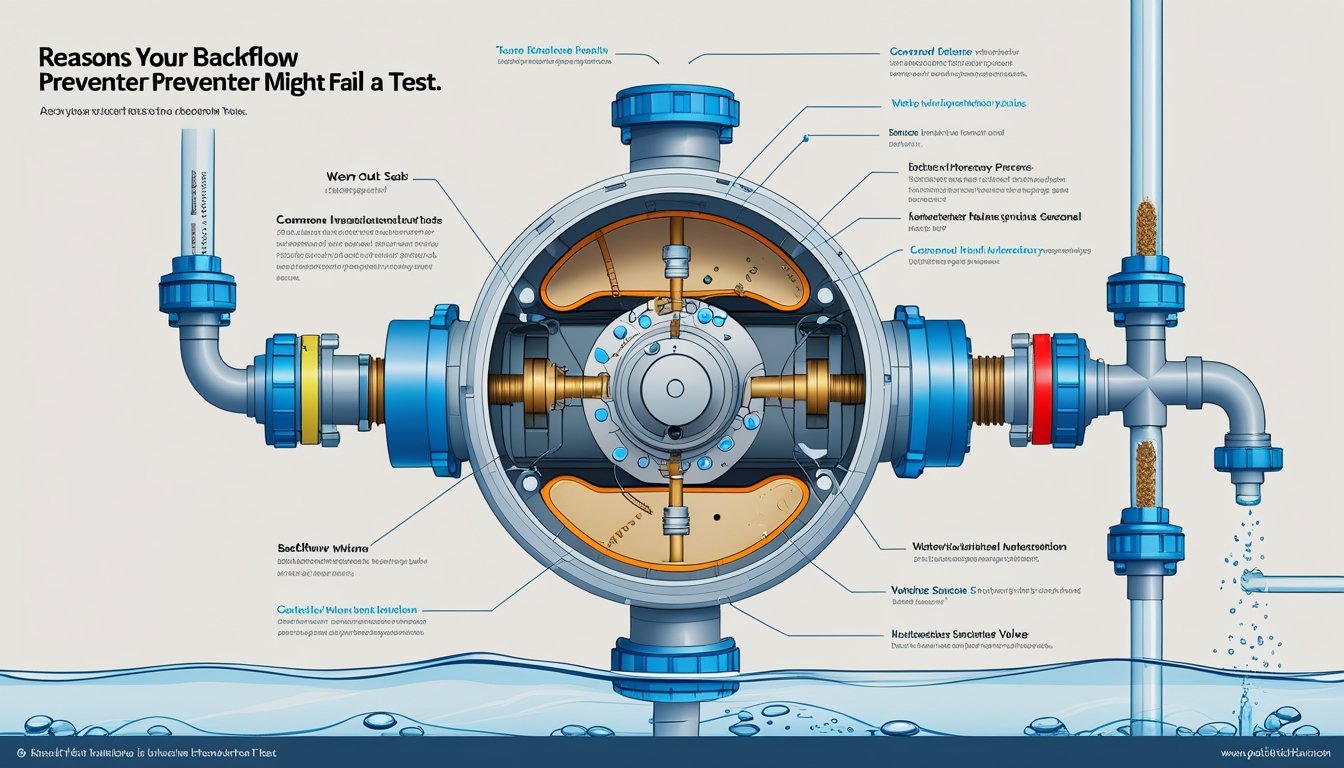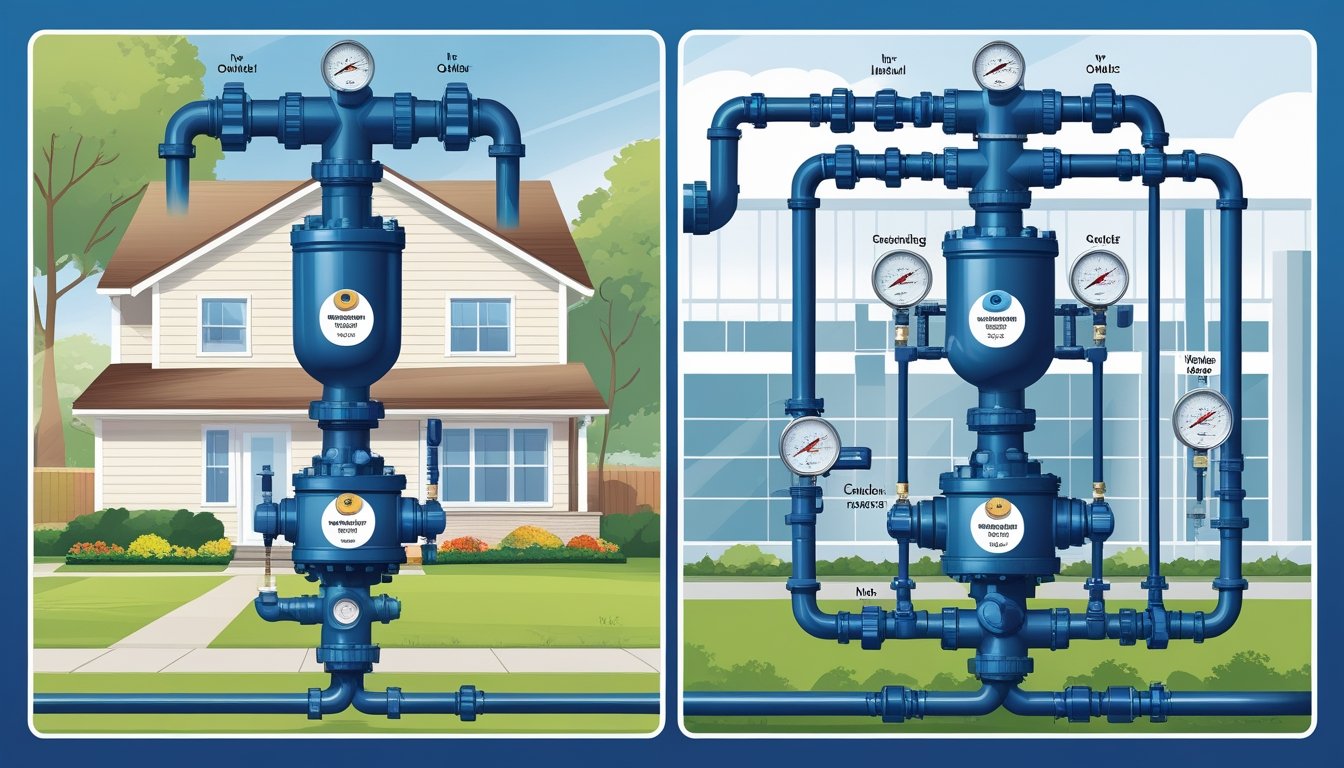Choosing the right certified backflow plumber is key to keeping your water safe and meeting local rules. Look for a plumber who is fully licensed, certified in backflow prevention, and experienced with your area's regulations.
This ensures the job is done right and your system stays compliant. You want a plumber who not only tests and repairs but also handles installations and replacements with care.
Reliable plumbers will submit all the necessary reports for you. This saves you time and stress.
It’s also important they respond quickly, especially in emergencies.
Understanding Backflow and Its Importance
Backflow is a plumbing problem that can affect your water supply. It happens when water flows the wrong way, mixing clean water with dirty or contaminated water.
Knowing how backflow works and why it matters helps you protect your home and your community's water safety.
What Is Backflow?
Backflow occurs when water moves backward in your pipes. This can happen if there is a sudden drop in water pressure, like when a fire hydrant is used nearby.
Dirty water or water with harmful substances can flow back into your clean water system. Backflow prevention devices stop this reverse flow.
These devices keep your water safe by making sure dirty water never reaches your taps. Regular inspection and testing are important to keep these devices working correctly.
Why Backflow Prevention Matters
Preventing backflow keeps your drinking water clean and safe. Without backflow prevention, chemicals, bacteria, or other contaminants could enter your water supply.
This can cause health problems for you and your family. Many local laws require regular backflow testing to protect public water systems.
Certified plumbers have the training and tools to test and fix backflow devices. By hiring a certified plumber, you make sure your system meets safety rules.
Risks of Untreated Backflow
If backflow is not stopped, it can lead to serious contamination. Drinking or using water with backflow contamination can cause stomach illnesses or infections.
For businesses and public buildings, backflow issues can result in costly repairs, fines, or shutdowns. Untreated backflow can also damage your plumbing system.
Contaminants can corrode pipes, causing leaks or other damage. Regular backflow testing and maintenance prevent these problems.
Why Hire a Certified Backflow Plumber?
Hiring a certified backflow plumber ensures your plumbing is safe, meets laws, and protects your water supply. Certification means the plumber has special training to handle backflow devices correctly.
This keeps your home and community safe from water contamination.
Legal and Safety Requirements
You must follow local laws about backflow prevention. Certified plumbers understand these rules and make sure your system works correctly.
Using a certified plumber helps you avoid fines or legal trouble if an inspection occurs. Certified plumbers use proper tools and methods to test and maintain backflow devices.
These devices stop dirty water from flowing back into clean water systems. A professional’s work reduces the chance of contamination that could harm your health.
Benefits of Certification
Certification means the plumber finished training focused on backflow systems. Certified plumbers pass exams proving their knowledge.
This training keeps them up-to-date on safety standards and plumbing codes in your area. You get peace of mind knowing the plumber can spot problems early and fix issues thoroughly.
Certified plumbers also ensure your system stays compliant with water district rules. This helps you avoid costly repairs or replacements later.
Protecting Your Home and Community
Backflow preventers protect not only your home but everyone’s water supply. When a certified plumber installs and tests your backflow system properly, you reduce the risk of widespread contamination.
Certified plumbers help keep local water safe by following strict guidelines. They maintain your system to stop potential leaks and failures.
By hiring them, you help protect clean water for everyone.
Key Certifications and Credentials
Choosing a certified backflow plumber means looking closely at their official qualifications and protections. These prove that your plumber has the right skills, follows the rules, and is prepared to handle your job safely.
Knowing what certifications and licenses to look for will help you pick the best professional.
Recognized Industry Certifications
Backflow plumbers should have certifications from recognized organizations approved by state water boards or local authorities. These certifications show they’ve completed specific training courses and passed exams in backflow prevention and testing.
In California, make sure a plumber is certified by a Water Board-recognized organization. This means they meet new, strict requirements effective since July 1, 2025.
The certification proves the plumber can properly test, maintain, and repair backflow devices. You should verify that the certification includes both written tests and practical assessments.
This combination ensures your plumber understands the technical rules and knows how to work with your equipment safely.
State and Local Licensing
Your plumber must hold the correct state and local licenses to legally perform backflow work. Some states, like Florida, require plumbers to have a valid plumbing license before getting backflow certification.
This ensures they understand local building codes and water system rules. You can check licensing with your state’s contractor board or local city offices.
Hiring someone without the proper license risks poor work or penalties. A licensed plumber also has accountability through official state channels if problems arise.
Licenses usually involve ongoing education. This helps plumbers stay updated on the latest backflow rules in your area.
Insurance and Bonding
Before hiring, confirm your plumber carries insurance and bonding. Insurance protects you if accidents or damages happen during the job, like water leaks or property damage.
Without it, you could be responsible for expensive repairs. Bonding is a type of financial guarantee that protects you if the plumber fails to complete the job or meet contract terms.
It offers added peace of mind when hiring a new or unfamiliar plumber. Ask for proof of both insurance and bonding before work begins.
Working with a fully covered professional means you are protected throughout the testing, repair, or installation process.
How to Verify a Backflow Plumber’s Certification
When choosing a backflow plumber, checking their certification is key to making sure they are qualified and meet local rules. You want to confirm their credentials and ask for proof.
Verify with official agencies to protect your water system. Each step ensures the work will be done right.
Checking Credentials Online
Start by searching online for your plumber’s certification status. Many states and local authorities have websites where you can enter the plumber’s name or license number.
This will show if they hold a current and valid backflow certification. Look for details like:
- Certification expiration date
- Issuing organization
- Any disciplinary actions or complaints
Make sure the certification is recognized by your local water board or regulatory authority. This step saves you from hiring someone without proper authorization.
Requesting Documentation
Always ask the plumber directly for copies of their certification and license. A certified backflow plumber should willingly provide:
- A valid backflow tester certificate
- Plumbing license if required
Check the documents for issue and expiration dates. Also, verify that the certification matches your state’s new standards, especially if rules changed recently.
Keeping these copies can help with compliance during inspections.
Consulting Local Regulatory Agencies
If you want extra peace of mind, contact your city or county water authority. They can confirm if the backflow plumber is approved to work in your area.
Some agencies also keep lists of certified testers. These agencies enforce backflow testing rules and can tell you if the plumber meets all local regulations.
This step helps you avoid fines or failed inspections caused by uncertified work.
Questions to Ask Before Hiring
Choosing the right backflow plumber means focusing on their skills, reputation, and the guarantees they offer. It also helps to understand their pricing and how they handle detailed estimates.
Asking the right questions can save you time and money while making sure your water stays safe.
Experience with Backflow Prevention
You want a plumber who really knows backflow prevention systems. Ask how many years they’ve worked specifically with backflow devices.
Find out if they have handled systems like yours — residential, commercial, or industrial. Certification is key.
The plumber should be certified to test, repair, and install backflow preventers. This shows they have passed state-approved training and exams.
A plumber with solid experience understands local codes and water district rules. Ask about the types of backflow preventers they’ve worked on and whether they keep up with the latest safety regulations.
Experience means fewer surprises and more reliable work for you.
References and Reviews
It’s smart to check what past customers say. Ask the plumber for references or look for online reviews.
Positive feedback from neighbors or businesses nearby can give you confidence in their service. You can also ask if they have worked in your area or with your water authority before.
This local experience means they understand specific regulations and reporting needs. Look for patterns in reviews — are customers happy with communication, timeliness, and overall results?
A trustworthy plumber will have a track record of reliable service and good customer care.
Service Guarantees
Service guarantees matter because they show the plumber’s commitment to their work. Before you hire, ask what kind of warranty they offer for repairs and installations.
Ask if they guarantee that repairs will pass the backflow tests and meet local water district standards. A plumber who stands behind their work will take care of issues that come up after the job.
Clarify what is covered and for how long. Some companies offer money-back guarantees or free return visits if problems happen.
This gives you peace of mind that your backflow device will work properly.
Pricing and Estimates
Getting a clear, written estimate before work starts is important. Ask the plumber how they price testing, repairs, and installations.
Are there extra fees for emergency or after-hours service? Make sure their estimate breaks down costs so you know what you are paying for, like parts, labor, and permits.
Comparing at least two estimates can help you find a fair price. Be wary of quotes that seem too low.
Quality parts and proper certification usually come with a reasonable price. Ask if they offer payment plans or if any follow-up testing fees are included.
This way, you get good service without surprises on your bill.
Comparing Backflow Plumber Services
When choosing a backflow plumber, think about what services they offer and how quickly they handle emergencies. Consider whether they provide ongoing maintenance plans.
These factors help you pick a plumber who fits your needs and keeps your water system safe.
Scope of Services Offered
Make sure the plumber offers a wide range of services like testing, repairs, installations, and replacement of backflow devices. You want a company that can handle everything from annual tests to urgent repairs.
Check if they also provide protection services, such as installing cages to prevent theft or vandalism. A plumber who offers these extra options shows they care about long-term security for your system.
Look for a technician who is certified and experienced with local regulations. This ensures your system stays compliant and safe.
Emergency Response Policies
Backflow problems can happen anytime, so quick service matters. Find out if the plumber offers after-hours or emergency service.
Ask how fast they typically respond to urgent issues. Some companies schedule emergency visits within hours, which can prevent serious damage or water contamination.
Knowing their policies for emergencies also means you won’t get hit with surprise fees. Clear pricing and quick communication give you peace of mind when problems arise.
Maintenance Packages
Some plumbers offer yearly maintenance plans to keep your system in good shape. These packages often include regular testing, inspections, and minor repairs.
A maintenance plan can save you money by spotting problems early. It also keeps you compliant with local rules.
Check if the plumber handles paperwork, like filing test reports with the city water authority. When this is included, you can focus less on paperwork and more on peace of mind.
Tips for a Smooth Backflow Plumbing Experience
To have a hassle-free backflow service, prepare your site and understand what the inspection involves. Being ready and knowing what to expect can save time.
Preparing for the Visit
Before the plumber arrives, make sure the backflow device is easily accessible. Clear any plants, debris, or obstacles around the meter or device area.
This saves time and helps the technician work quickly. Have your test notice or any past inspection reports ready.
Sharing this information with the plumber helps them understand your system better. Confirm if pets or children need to be kept away during the visit.
Write down any questions or concerns you have. This helps you get clear answers during the service.
Understanding the Inspection Process
During the inspection, the certified technician will isolate the backflow device and test its parts with special equipment. They check that no water flows backward, which could contaminate your clean water.
The test usually involves checking valves and seals to make sure they work properly. If anything is wrong, the technician will explain what repairs or replacements are needed.
After testing, the plumber will file reports with local water authorities. You will also get copies for your records.
This step is important to avoid fines or water quality issues.
Ongoing Backflow Prevention Maintenance
You need regular care to keep your backflow preventer working well. Annual testing is very important.
This helps make sure your device works correctly and meets all local rules. Certified plumbers should do this testing for you.
If your backflow preventer fails a test or breaks down, repairs must happen quickly. A certified plumber will fix or replace parts to stop leaks and keep your water safe.
You should also protect your backflow device from damage or theft. Durable security cages can help keep it safe long-term.
Here’s what ongoing maintenance usually includes:
- Annual testing by a certified technician
- Repairs if the device fails or leaks
- Replacement when parts are old or worn out
- Protection to prevent tampering or theft
Certified plumbers handle testing, repairs, and emergency services if you need help fast. Keeping up with maintenance protects your water and your home or business.
Contacting Certified Backflow Plumbers in Your Area
When you need a certified backflow plumber, look for licensed professionals with experience in your local area. Certified plumbers have the right training to test, repair, and install backflow preventers safely.
You can find certified plumbers by checking your local health department or licensing board. Many companies also let you request services online or by phone.
Here’s a simple way to contact a trusted backflow service:
StepWhat to Do 1. Request a Backflow TestSend your test notice by email, fax, or upload it online.2. Inspection & TestingA certified technician will inspect and test your device promptly.3. Reports & ComplianceThe plumber files the test results with local authorities for you.
Choose a service that handles repairs and replacements if needed. Some companies also offer protection cages to prevent theft or damage.
Look for plumbers who offer quick emergency service. Backflow problems can affect your water supply, so it's important to get fast help when things go wrong.
Choosing a team with good communication and local knowledge can make the process smooth. Don’t hesitate to ask about their experience and certification.
Frequently Asked Questions
You want a plumber who holds the right certifications, knows local rules, and has experience with backflow devices. Knowing when to call a pro, how often tests are needed, and the costs involved will help you keep your water safe.
What qualifications should I look for in a plumber for backflow prevention installation?
Look for a plumber who is certified in backflow prevention and testing. They should have completed training that covers local regulations and device mechanics.
Experience in your area is important because rules can vary.
How can I verify a plumber’s backflow certification?
You can ask the plumber to show you their certification card or license. Many states offer online databases where you can check if the certification is current and valid.
Confirm the plumber follows local water authority standards.
What are the signs that I need a professional backflow service?
If your water tastes or smells strange, or if you have noticed low water pressure, these could be signs. If you haven’t had your backflow device tested in over a year, or if there’s visible damage or leaks, call a professional.
Could you suggest the average costs associated with hiring a certified backflow plumber?
Typical backflow testing costs range from $75 to $150, depending on your location and device type. Repairs or replacements cost more, usually several hundred dollars.
Always ask for a written estimate before work starts.
How often do I need to have my backflow preventer tested or replaced?
Most places require annual testing. Some older devices may need replacement if they fail tests or show signs of wear.
Following local rules and scheduling yearly inspections helps avoid bigger problems and fines.
What are the consequences of not having a certified plumber install a backflow device?
Non-certified work can lead to water contamination and fines. You might also fail to meet local codes.
An uncertified installer might not test or maintain the device properly. This can risk your health and safety.











